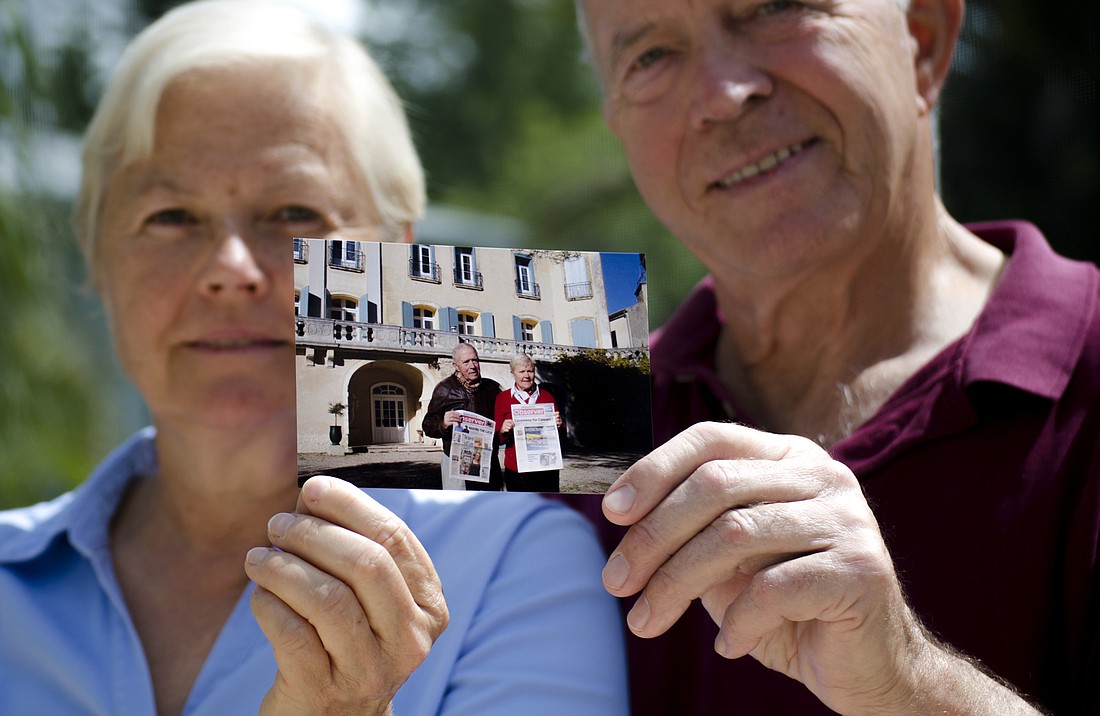- November 23, 2024
-
-
Loading

Loading

Patrimoine is the French word for a person’s heritage.
It signifies a collective culture, a shared story, and it’s Martine and Pierre Filiatrault’s reason for the for-sale sign in the yard of their Osprey home.
Martine Filiatrault, a French native, and her husband, Pierre, a Canadian, have wintered in Osprey since 1999.
However, in 2013 the couple’s priorities changed. Martine Filiatrault’s cousin Nicole Traverse-Boussaguet died, leaving the couple to decide what to do with her estate.
In this case, the estate happened to be a 24,000-square-foot 14th century castle — the Chateau de Gaujac.
“It was a decision of the two of us that either we take it or the government was going to take it,” Pierre Filiatrault said. “There was not a third alternative.”
Traverse-Boussaguet bought the property in Gaujac, France in 1978. The French would say it was a coup de foudre, which directly translates to a stroke of lightning. It means love at first sight.
Gaujac is a small town of about 1,000 people just over 400 miles southwest of Paris. Nestled in the hill country, vineyards and fruit trees surround the village.
The castle’s original resident, Monsieur de Gaujac, built the structure on a hill. Buildings dot the slope, building to one central point. While wandering through the town, Traverse-Boussaguet looked up.
“She fell in love with the place … It’s as simple as that,” Martine Filiatrault said.
Its owners had largely abandoned the property for 30 years, but Traverse-Boussaguet had an eye for potential. She was a sculptor by education married to a filmmaker.
Together, they set out to create what would be their final masterpiece, one room at a time.
“They started living in one room and then two rooms,” Martine Filiatrault said. “They did it with so much passion. They had a dream. Unfortunately, it stopped for him earlier than they would have thought.”
Traverse-Boussaguet’s husband died in 1992. After his death, she filled the castle with art, holding exhibitions and concerts in the grand salon.
She died, but her dream didn’t.
“When we saw all the passion and the work, of course, you want to go on with that,” Martine Filiatrault said.
So they picked up where Traverse-Boussaguet left off.
It wasn’t an easy decision. The property has historic protection requiring the pair open the castle to the public 66 days a year.
"History belongs to everybody." - Martine Filiatrault
They give tours for 5 euros — $5.35 in U.S. dollars — between the last week of June and the first week of September. They maintain the grounds, restoring windows and rebuilding towers made out of medieval brick.
The pair doesn’t profit off their enterprise. The castle is simply a catalyst to honor their cousin’s passion, and, as Martine Filiatrault puts it, fasten a link to French history.
History, Martine said, is like a chain. Each event, each structure is a link in what becomes a county’s heritage, its patrimoine.
“Everyone brought their stone to that structure and modified it, and it keeps going on,” Martine Filiatrault said.
There are thousands of castles like Chateau de Gaujac in France.
They are passed down to relatives or purchased by people like the Filiatraults. However, not everybody has the means to keep their links in the chain strong.
“The government cannot afford to spend money on so many (castles). So the effort has to come from some people, but not everybody can,” Martine Filiatrault said. “It’s a choice ... Otherwise it can pretty much get destroyed or get left alone.”
It’s an ever-pressing reality for the Filiatraults.
At 57 and 69 years old, Martine and Pierre Filiatrault know their passion won’t last forever. With no children, eventually they will have to find a buyer for their castle on a hill.
“For now, we are in that situation where we are thinking about the future while we keep working,” Martine Filiatrault said. “We still have the energy, and we love that place.”
This could be their last season in Osprey. When their house sells, they will become full-time residents of France.
After a day of work, they’ll sit on their terrace with a view of Mont Ventoux, watching the sun set over the hills, motivated by their shared belief that their patrimoine is worth saving.
“History belongs to everybody,” Martine Filiatrault said.